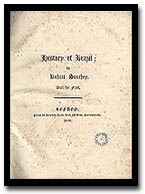


|
SOUTHEY,
Robert. History of Brazil. London:
Printed
for Longman, Hurst, Rees and Orme.1810 e 1819.
For sixteen years (1806-1822), the English poet Robert
Southey dedicated himself to writing his History of Brasil. What the author himself told
a friend in a letter would be a book never to perish because fir many generations of Brazilians
it would represent something similar to what Herodotus's book meant to Europeans, was written
at a very special moment for Southey in particular and most of his compatriots in general. The
crisis brought on by the war and the Continental embargo had a violent effect on the production
of the factories of industrial centres like Birmingham, Lancashire and Nottingham, causing deep
social tension. In 1810 was published the first of three compact volumes of a more ambitious
project that was never realised, including Portugal and other parts of the Empire. Unemployment
and bankruptcies expressed the depression that followed the end of the war when the second
volume came out in 1817. Social agitation spread throughout many places in the Kingdom when the
last volume was published in 1819. The transition to Victorian England was announced both by
the artisans' resistance to proletarisation and the growing organisation of workers, as well as
by the struggle of business sectors in favour of liberalism and against the privileges of the
aristocracy.
Without ever having been in Portugal's American colony, Robert Southey wrote his
História based on the collection of books and manuscripts on Luso-Brazilian
topics that belonged to his uncle who had been chaplain of the Anglican community in Porto and
Lisbon, in addition to his own research during a short visit to Portugal. Also of use was the
information provided by Henry Koster and John Luccock, who had lived in Brazil for some years,
as well as some Luso-Brazilians, such as Father João Ribeiro, who had taken part in the
Pernambuco Revolution of 1817.
A disciple of the political philosophy of Burke and
Coleridge, Southey at times found inspiration in Herder and the English pre-Romantics. His
sympathies lay with the humanitarian Reformists, and he shared with the liberals of the
Manchester school the same faith in the absolute superiority of English civilisation. Robert
Southey's História is accordingly conservative in tone. The poet turned
historian abhorred revolutionary agitation, feeling that this only helped to disturb the
spontaneous course of necessary changes.
Nevertheless, Southey did not fail to criticise severely
the Portuguese colonising experience in America. Although he admired racial mixing and what he
saw as a policy of ethnic integration on the part of the Portuguese Kingdom, he censured the
vices of the slave-owning aristocracy and the power of the local potentates, as well as the
absence of community ties. His defence of strengthening the State and institutionalising
paternalist social bonds made him hopeful concerning the arrival of the Portuguese Court in
Rio de Janeiro, seeing this as a chance to found an empire whose mission would consist of
adjusting the country to the civilising benefits of English trade.
The importance of Southey's work, which is greatly
valued by the builders of the Brazilian Empire and by the defenders of centralised monarchy
and slavery, is expressed by Capistrano de Abreu as follows: "... in short, Varnhagen's
História Geral is inferior to Southey's História do Brasil in form,
conception and intuition, but is second only to this History."
|



